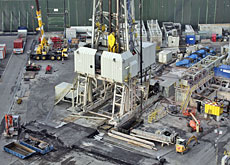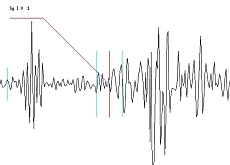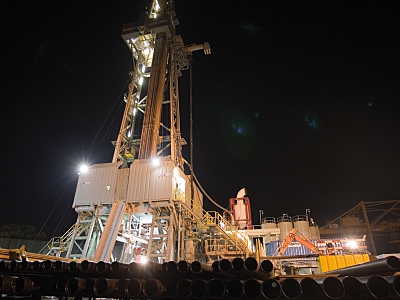Geothermal project lands in hot water

Basel authorities are investigating the risks of pursuing a geothermal project after drilling work triggered a series of earthquakes in the city.
Since December 8, Basel has been hit by four minor tremors on the site of the Deep Heat Mining project, which involves recovering heat to generate electricity by pumping water deep into the Earth’s crust.
The last minor quake occurred on Friday morning, although the company behind the project had stopped work in December. Further shockwaves, even larger ones, cannot be excluded.
Amid criticism, activities at the plant have been officially suspended while the local authorities and Geopower, the company behind the project, decide on its future.
“Too many questions remain unanswered to give a sound, definitive decision for or against the project,” said Basel parliamentarian Barbara Schneider, who heads the public works department.
Last week the Basel government took a first step by announcing that it was going to carry out a full “quantitative” risk analysis based on new data to help decide whether or not the project should be resumed.
“The decision was taken not to take a decision about the project,” Marc Keller, spokesman from Basel’s public works department, told swissinfo.
“The Basel people need to know before the end of the year what the risks would be if work were to restart,” explained Schneider.
Setback
As the risk analysis will probably take one or two years, the earliest that drilling can resume at the Kleinhünigen plant is in four years’ time.
Despite the setback, the authorities remain firm supporters of the project and its technology.
“It would be premature to abandon the project given the opportunities associated with the technology. But it would be equally premature to re-start work at the plant,” they wrote.
For the time being the project remains on hold but it is likely to develop into a political hot potato. The Basel parliament has to vote on project funding and a date has yet to be set, and since December, local people have been up in arms about what happened.
“I no longer have confidence in our government…I don’t understand why such a project was accepted in a city known for being located on a seismic fault,” Armin Fretz, a local resident living eight kilometres from the site, told Le Temps newspaper.
Damage
The injection of water into rocks five kilometres below the surface began at the start of December, but only lasted a few days. As well as the three major tremors, more than 100 small incidents have been recorded, resulting in 700 requests for compensation after damage – mostly cracks on walls.
Markus Melzl, spokesman for the Basel public prosecutor’s office, has also logged around 200 official complaints for threats against the population and damage to property.
“Owing to the unusual nature of an earthquake caused by man, we are seeking legal advice,” he explained. The company, Geopower, could be charged with negligence.
The information strategies of Geopower and the Basel authorities have also come under fire.
In reply Schneider admitted that the Basel people had been badly prepared for any tremors. As part of a damage-limitation campaign, expert opinions on the project were last week published on their website.
Complaints
But sharp criticism has also rained down from other experts.
Nicolas Deichmann of the Swiss Seismological Service complained that his organisation had not been consulted over the initial authorisation process.
“The seismological service would have asked for clarification on additional points if we had been mandated from the start,” he said.
The seismological service and other experts say they stressed the need not to ignore the danger of possible tremors and to keep the authorities and the general public informed.
“Deep Heat Mining has been used often in the past,” said Deichmann. “But under different rock conditions than those underneath Basel.”
swissinfo with agencies
Converting geothermal heat into electricity by pouring water onto hot rocks underground and using the steam to turn turbines is arguably the most promising – and renewable – source of “green” energy on the planet.
Experts at the Massachusetts Institute of Technology claim that the United States can kick its addiction to fossil fuels by drilling more wells to tap the Earth’s heat.
The Swiss Deep Heat Mining project aims to set up a geothermal power plant in Basel by 2009.
Until now, environmentally friendly geothermal power has only been generated in areas where heat is close to the surface, such as in volcanic regions. The water injected five kilometres down reaches temperatures of around 200 degrees Celsius.
The Basel plant should be able to deliver heat to 2,700 nearby homes and electricity to 10,000. It would be first commercial power plant of it kind anywhere in the world.
To shelve the project now would be extremely costly as some SFr56 million ($45 million) of the SFr80 million ($64.7 million) budget has already been spent.
Canton Basel City has stumped up SFr32 million, leading a host of other investors including energy suppliers.
In Switzerland, between 300 and 400 earthquakes are recorded annually.
Normally there are three or four earthquakes measuring in the region of 3.4 on the Richter scale every year in Switzerland.
Basel is one of the areas in Switzerland particularly prone to seismic activity. In 1356, the city was almost destroyed by a 6.5-magnitude earthquake.
A minor quake of 3.3 on the Richter scale hit the city on Friday morning.

In compliance with the JTI standards
More: SWI swissinfo.ch certified by the Journalism Trust Initiative


You can find an overview of ongoing debates with our journalists here. Please join us!
If you want to start a conversation about a topic raised in this article or want to report factual errors, email us at english@swissinfo.ch.